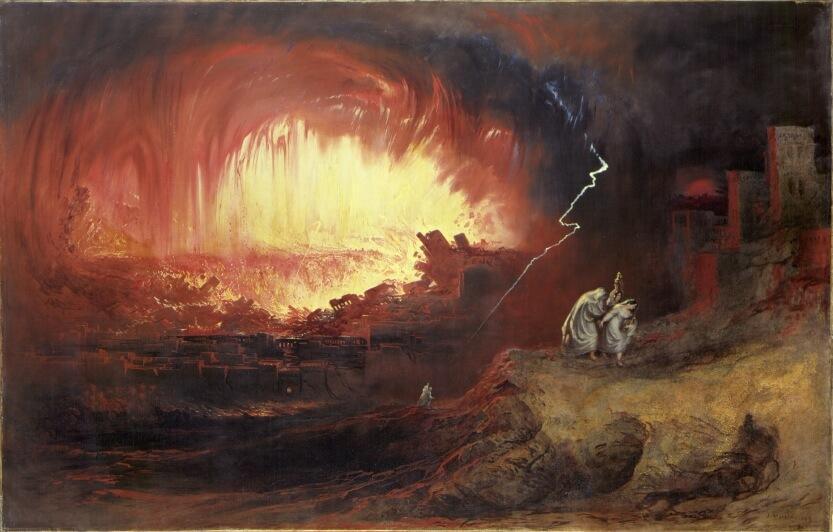Blog Search Results

Did you mean:
barnabas
?
12 results for Barnabas
found
within the Blog
6 displayed out of 12 (0.39seconds)Page 1 of 2

The Coming of Jesus: The Olivet Discourse – Part 2
Posted by Luke J. Wilson on 3rd February 2016 in Second Coming Series | Second Coming,Return of Christ,Return of Jesus,Preterism,Prophecy,Last Days,Left Behind,Eschatology,Matthew 24,Olivet Discourse,Josephus,history,Part 2,Desolation,Temple Destruction,Jewish War,70AD
...pistle of Barnabas (not the be confused with the much later 14th century forgery called “the gospel of Barnabas”).
This, along with other early texts known as “the Didache” and the "Shepherd of Hermas”, were books commonly given to new converts to read during the first century (Shepherd was even considered as Canon by various Early Church Fathers, such as Irenæus).
As an intriguing side-note, the 4th century “Codex Sinaiticus” included Barnabas and The Shepherd alongside the rest of the New Testament books in its canon.
Barnabas even links the 70AD event to the completion of “the Week” which harkens back to Daniel’s prophecy, as did ma...
Understanding The New Testament: Inspiration, Canonisation, And Historical Context
Posted by Luke J. Wilson on 23rd December 2023 in Early Church | Inspiration,Scripture,early church,early church fathers,islam,Bible
...pistle of Barnabas, and the Didache. Within the Early Church, there existed differing opinions on whether these particular texts merited canonical status, though.
Eusebius, who wrote Church History (~325), used the Greek term “antilegomena” to refer to the group of disputed writings. He uses this word in two places when speaking about these texts:
It is not indeed right to overlook the fact that some have rejected the Epistle to the Hebrews, saying that it is disputed [αντιλέγεσθαι] by the Church of Rome, on the ground that it was not written by Paul. (3.3.5)
Among the disputed writings [των αντιλεγομένων], which are neverthele...
An Examination of Conditional Immortality (Part One)
Posted by Luke J. Wilson on 25th May 2020 in Hell | Conditional Immortality,Annihilationism,church fathers,church history,Hell,theology
...pistle of Barnabas, who, in his conclusion, states that: “For the day is at hand on which all things shall perish with the evil [one].”. This would even imply that the devil will eventually perish as well, along with everything that doesn’t belong to the Lord.
A little later on from these text around AD 130, the anonymous Epistle of Mathetes to Diognetus gives a similar interpretation that “death” truly means death and that the fire consumes those in it “even to the end”, implying the condemned survive long enough to be punished, but will eventually be consumed by the fire:
…when thou shalt despise that which is here esteemed to be death, when...
Who is the New Jerusalem?
Posted by Luke J. Wilson on 6th January 2016 in Second Coming Series | Revelation,New Jerusalem,The Church,Holy City,Early Church,Early Church Fathers,Eusebius,Origen,Barnabas,millennium,millennial reign,1000 years,New Heaven and Earth
...letter of Barnabas is one of the earliest texts we have outside of the New Testament, and so reflects a very early view from the Early Church period and the theology surrounding a new temple.
Barnabas 16:5-6
"Again, it was revealed how the city and the temple and the people of Israel should be betrayed … For it is written, ‘And it shall come to pass, when the week is completed, the temple of God shall be built...in the name of the Lord.’ I find...that a temple does exist. Having received the forgiveness of sins…in our habitation God dwells in us….This is the spiritual temple built for the Lord.”
Examining the rest of the description of the...
The Eighth Day
Posted by Luke J. Wilson on 26th October 2016 in Eschatology | eighth day,early church,new creation,baptism,resurrection,eschatology,sabbath,Lord's Day,Festival of Booths
...he dead.
Barnabas 15:8-9
Barnabas, in his epistle, makes the first recorded mention of this day as specifically called the “eighth” which is as early as somewhere between 70 - 130 AD.
But the concept of an "eighth day" isn't new and is found throughout the Scriptures in the Old Testament, specifically in the last of the great feasts: the feast of booths (Leviticus 23:33 onwards), and circumcision on the eighth day after birth. The priests and Nazirites also had seven days of cleansing before offering sacrifices specifically on the eighth day (Numbers 6, Leviticus 8:33ff).
The apostles pick up on these themes, like with the eight people, including N...
The Historic Practice of Abortion and How Ancient Christians Responded
Posted by Luke J. Wilson on 1st July 2022 in Abortion | abortion,roe v wade,church history,current events,theology,politics,Why Are Christians Against Abortion?
...pistle of Barnabas, c. AD 70
This attitude towards what was seen as a repulsive and murderous practice continued to be written about and condemned by church leaders for centuries after this too.
[Christians] bear children, but they do no destroy their offspring. — Letter to Diognetus, c. AD 130
We say that those women who use drugs to bring on abortion commit murder. And we also say they will have to give an account to God for the abortion. — Athenagoras, c. AD 175
Although keeping parrots and curlews, the [pagans] do not adopt the orphan child […] they take up the young of birds. So they prefer irrational creatures to rational ones! — Cl...

